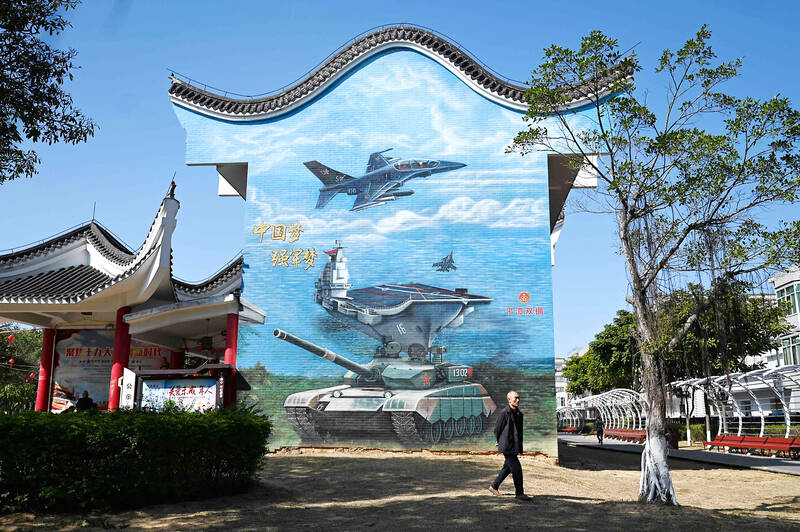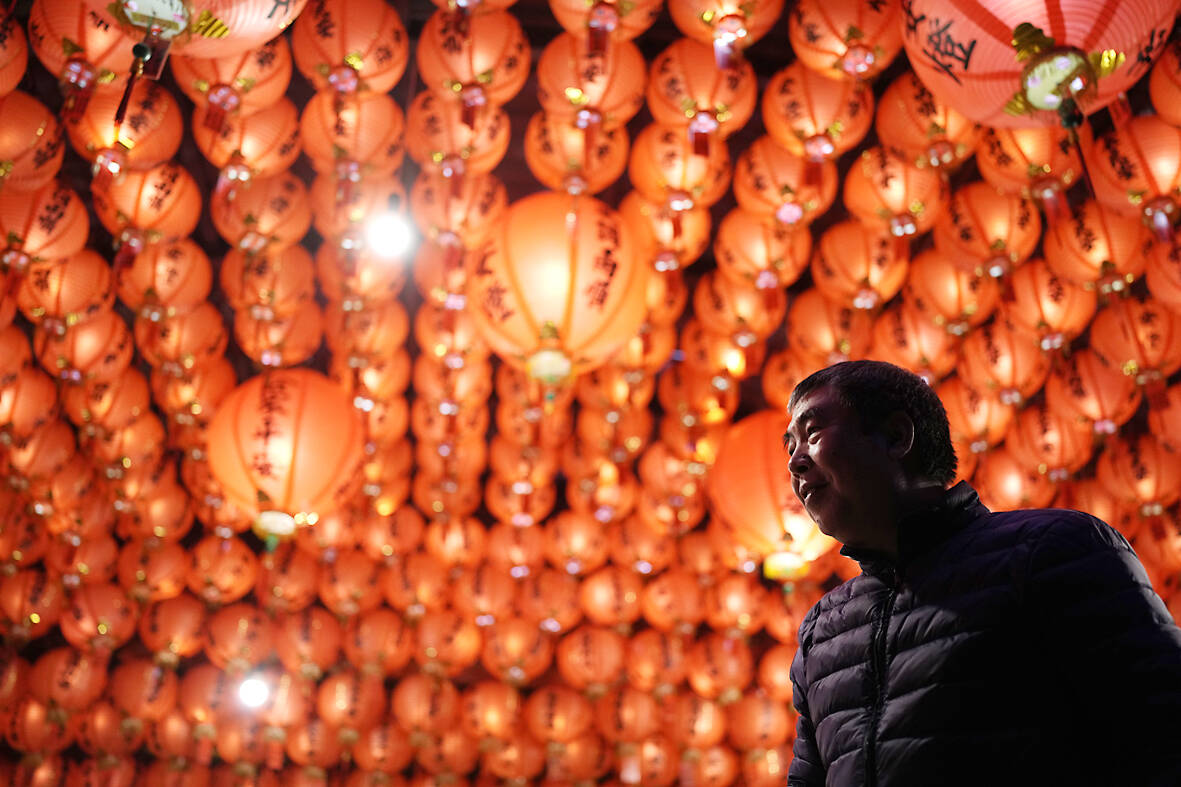China conducted joint combat patrols around Taiwan on Wednesday, in a potential resumption of military intimidation after Taiwan’s presidential election last weekend. But analysts say the reaction from China’s ruling Communist party has been relatively muted so far, despite the success of the ruling Democratic Progressive party (DPP) — which Beijing loathes as “separatists” — in retaining the presidency.
Yesterday morning the Ministry of National Defense reported the People’s Liberation Army had sent 24 planes and five navy vessels into Taiwan’s air defense identification zone in the previous 24 hours, the first incursion of significant size since November. The air and sea craft conducted joint patrols including crossing the unofficial maritime border, the median line, it said.
The patrol followed the shock announcement on Monday that the government of Nauru was severing ties with Taiwan and switching recognition to China, the 10th diplomatic ally of Taiwan that Beijing has managed to flip since the DPP and President Tsai Ing-wen (蔡英文) won the 2016 election.

Photo: AFP
Beijing has also issued angry statements to other governments that congratulated president-elect William Lai (賴清德) on his win. English-language state media, especially the hawkish Global Times tabloid, has run dozens of negative articles and editorial pieces about the election.
However, beyond these incidents, Beijing’s reaction to the election has been relatively muted, approaching nowhere near the scale of its previous outbursts over the visit of then US House speaker Nancy Pelosi to Taiwan or the US meeting between Tsai and Pelosi’s successor, Kevin McCarthy.
“It’s a pretty positive start to this period, but I think we still need to see what will happen, it’s a very interactive situation,” said Amanda Hsiao (蕭嫣然), a Taipei-based senior China analyst with the International Crisis Group.

Photo: AP
China engaged in influence operations ahead of Taiwan’s vote, but visibly reduced its military activity, which analysts had linked to a perception that any threatening activity would probably bolster the pro-sovereignty DPP.
Analysts also pointed to recent significant improvements in the China-US relationship.
“It’s not like Beijing just decided to, there’s been a concerted attempt by Washington and Taipei to signal continuity and to lower the temperature,” Hsiao said.
“A key factor for why China’s response has been measured, perhaps the most important, is that they don’t want to tear up the gains made in improving US-China relations.”
INAUGURATION
However, a stronger response may come when Lai is inaugurated in May.
Ja-Ian Chong, a political scientist at the National University of Singapore, said there was likely to be increased pressure from Beijing in the lead up, as it “probably wants to see how much it can get Lai to concede and then to hold him to their interpretations of those concessions.”
Lai is not expected to deliver what Beijing wants, which would effectively be a reversal of the DPP’s platform of resisting China’s claims and promoting Taiwan’s sovereignty.
“[Beijing] often waits for a justification for its actions, and we know Lai is going to give them that because he’s not going to say what they want him to say,” said Hsiao. “That alone means Beijing will have something to point to if they want to point to something to justify a larger response.”
But Hsiao said the size and intensity of that response shouldn’t be assumed, and would depend on how Beijing, Taipei and Washington communicate and interact in the lead-up.
Chong said Beijing would probably try to test or goad Lai into a provocation after his inauguration.
“The PRC [People’s Republic of China] is probably going to see if they can force Lai into making a mistake or frustrating him into making a rash move, which they can then paint as Lai being provocative and seek international agreement on.”
‘A CONTINUATION, IF NOT INTENSIFICATION’
The election result was closely watched inside China, and the DPP’s lack of a mandate in both the presidential and legislative votes prompted increased discussion about winning over Taiwanese through non-violent means, while still preparing for a military intervention. Polls show that an overwhelming majority of the population rejects the prospect of Chinese rule, but the minority win allowed China’s Taiwan Affairs Office to argue on Sunday that the DPP “does not represent the mainstream public opinion on the island.”
On Monday parts of a 2022 speech by China’s leader, Xi Jinping (習近平), who has previously described unification of Taiwan with China as a “historical inevitability,” were newly published in state media, urging CCP workers to do better at winning the hearts and minds of Taiwanese, and to “develop and strengthen the patriotic, pro-unification forces in Taiwan, [and] oppose the separatist acts of ‘Taiwan independence.’”
Chong said: “At face value, the Xi speech suggests a continuation, if not intensification, of cognitive, psychological, economic and political pressure in the form of isolating Taiwan, co-opting entities and individuals in Taiwan, placing pressure on Taiwanese businesses, disinformation, and the like.”
In an article published the day after the vote, Zheng Yongnian, a professor of international relations at the Chinese University of Hong Kong, Shenzhen, wrote: “there is a need to actively win over the new forces of Generation Z … to promote the resolution of the Taiwan issue in the new era, we must pay attention to innovative cross-strait communication platforms, focusing on the use of new media platforms such as Xiaohongshu and Douyin, to circulate and change the identity of young people in Taiwan.”
In recent years, there has been a growing concern in some circles that the popularity of Chinese social media apps among young Taiwanese is influencing generation Z into a more pro-Chinese worldview.

Anyone who has been to Alishan (阿里山) is familiar with the railroad there: one line comes up from Chiayi City past the sacred tree site, while another line goes up to the sunrise viewing platform at Zhushan (祝山). Of course, as a center of logging operations for over 60 years, Alishan did have more rail lines in the past. Are any of these still around? Are they easily accessible? Are they worth visiting? The answer to all three of these questions is emphatically: Yes! One of these lines ran from Alishan all the way up to the base of Jade Mountain. Its

The only geopolitical certainty is that massive change is coming. Three macro trends are only just starting to accelerate, forming a very disruptive background to an already unsettled future. One is that technological transformations exponentially more consequential and rapid than anything prior are in their infancy, and will play out like several simultaneous industrial revolutions. ROBOT REVOLUTION It is still early days, but impacts are starting to be felt. Just yesterday, this line appeared in an article: “To meet demands at Foxconn, factory planners are building physical AI-powered robotic factories with Omniverse and NVIDIA AI.” In other words, they used AI

Nov. 25 to Dec. 1 The Dutch had a choice: join the indigenous Siraya of Sinkan Village (in today’s Tainan) on a headhunting mission or risk losing them as believers. Missionaries George Candidus and Robert Junius relayed their request to the Dutch governor, emphasizing that if they aided the Sinkan, the news would spread and more local inhabitants would be willing to embrace Christianity. Led by Nicolaes Couckebacker, chief factor of the trading post in Formosa, the party set out in December 1630 south toward the Makatao village of Tampsui (by today’s Gaoping River in Pingtung County), whose warriors had taken the

Last month historian Stephen Wertheim of the Carnegie Endowment for International Peace published an opinion piece in the New York Times with suggestions for an “America First” foreign policy for Democratic presidential candidate Kamala Harris. Of course China and Taiwan received a mention. “Under presidents Trump and Biden,” Wertheim contends, “the world’s top two powers have descended into open rivalry, with tensions over Taiwan coming to the fore.” After complaining that Washington is militarizing the Taiwan issue, he argues that “In truth, Beijing has long proved willing to tolerate the island’s self-rule so long as Taiwan does not declare independence